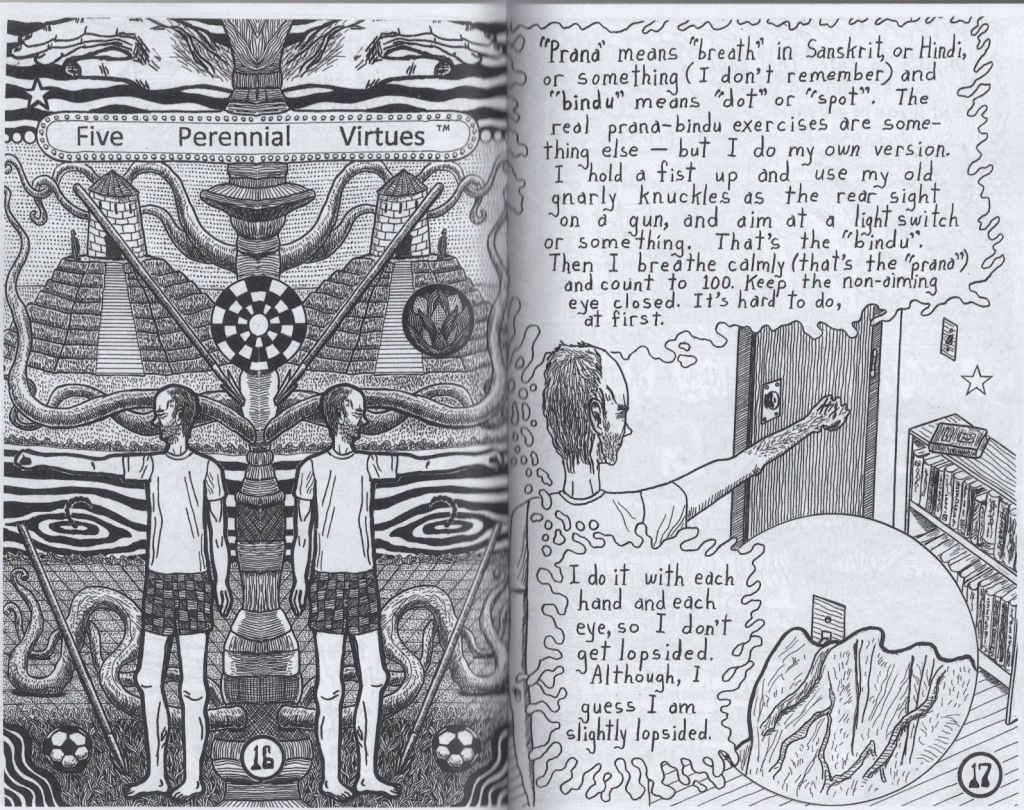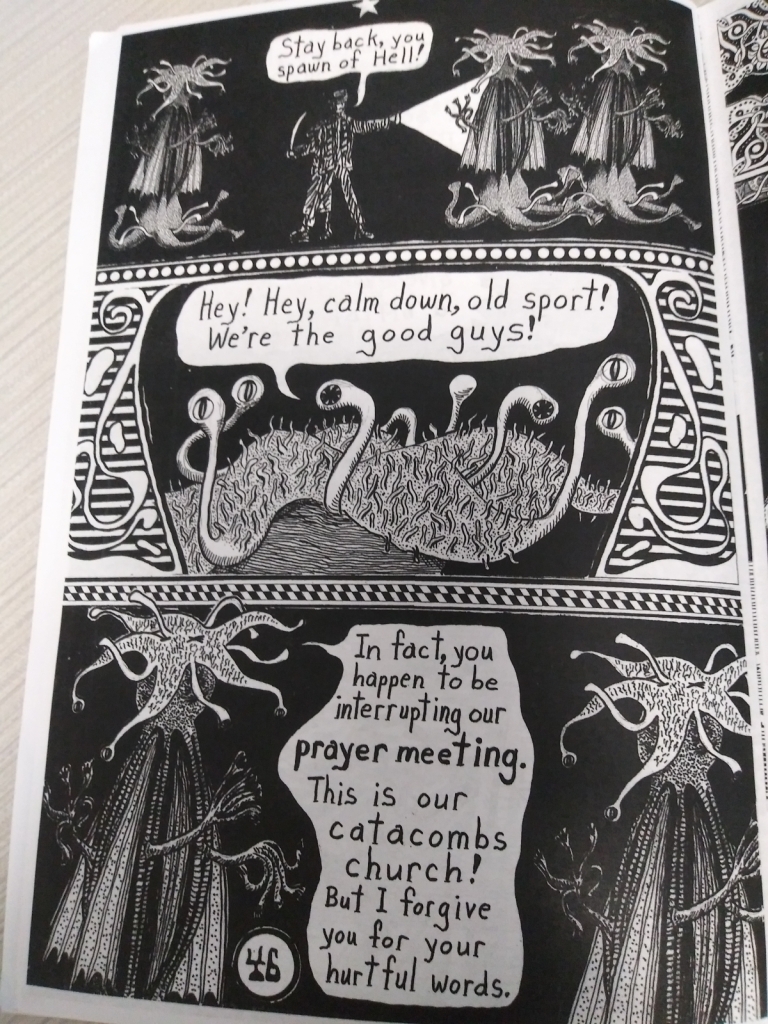
Something tells me that if the late, great Steve Ditko didn’t harbor a sense of utter disdain for mysticism (I know, I know, weird considering he created the character of Dr. Strange) that he’d like David Tea’s comics : intricate bordering on the obsessive, singular in their approach, making little to no allowances for popular taste, and more than a trifle inflicted with/influenced by (depending upon one’s point of view) a kind of esoterically-flavored cultural and even political conservatism that probably doesn’t have much of a place in the MAGA clown car even though it shares at least a few of its goals, Tea strikes me as Ditko’s heir apparent and antithesis in almost equal measure, a “fellow traveler” who set out on a separate path. One that, crucially, doesn’t preclude the direct involvement of the supernatural in everyday life.
And, really, everyday life has always been — and remains — Tea’s focus, but he has a way of making even its most mundane minutiae seem interesting, alien, and altogether new. In the same way that a cat can be utterly enthralled with going after the same piece of string for the 10,000th time (and Tea has actually made a comic about that very subject), the unfolding episodic narrative that is Five Perennial Virtues can follow the same basic formula with entirely different results each issue.

Although, in absolute fairness, “results” may not be what this comic is even after — as cliched as it is to say something is “all about the journey,” in this case it’s nevertheless absolutely true. Issue number twelve of Tea’s irregularly self-published series, subtitled “Pearl,” has just been released and is laden with explication, extrapolation, and explanation — some pages are quite literally a “wall of text” — and yet, as is the case with life itself, we’re no “further along” in many key respects at the end than we were at the start. Hell, it remains an open question how much of this narrative is “real” and how much is a “dream,” but the damned thing is : at some point you stop caring about such trivialities and just accept what’s unfolding on the page for what it is — whatever that may be.
For my own part, I’ve long since stopped trying to define what I term, in wholly unoriginal fashion, the “David Tea comics experience,” and just kind of surrendered to it. This isn’t work that takes a page from any particular playbook or stylistic tradition, but likewise it’s too well-versed in the tropes and trappings of sequential storytelling for me to feel comfortable labeling it as “outsider art.” Tea is clearly schooled in how comics have been made — in how, the narrow-minded would argue, they “should” be made — but either through conscious disregard of said strictures or distinct lack of interest in maintaining/perpetuating them, his work has achieved, and continues to build upon, a loose visual and narrative language entirely its own.
There is no mistaking a comic by this dude for a comic by anyone else.

It is, therefore, wholly accurate to say that the nuts and bolts of what’s happening in Five Perennial Virtues #12 can be summed up as : “disheveled (possibly homeless?) Dave meets an attractive and interesting young lady, behaves oddly, and weird things happen — plus fourth-wall-busting philosophical asides,” but the thing about truth and accuracy that makes it such a pain in the ass is that it’s far too confining to apply to art. And so, as with the set-up of one of Tea’s plots, I look at the entirety of these comics as a springboard to something else, some other way of observing life on the one hand but also experiencing it on the other. I don’t know if that’s the intention, but then I don’t know that Tea can be accused of even having something as pedestrian as an “intention” in the first place. I recall, for instance, asking him a few years back when I interviewed him what his titular five perennial virtues were, and he told me that he was still figuring that out — but that he was pretty sure that, yes, there were five of them.

Take a moment and let that sink in : with nearly two decades of cartooning under his belt — a point at which most of his “peers” think they’ve got more or less everything figured out — David Tea is still feeling his way forward, learning on the job, deciding both what the hell he wants to do with his art and how he wants to do it. And that, right there, is what makes his comics not only interesting, but vital. Time will tell if the repeating symbolism and Biblical asides of “Pearl” are things he returns to or discards in future issues — if this is a taste of things to come or a one-off aside — but we needn’t worry either way : Tea will do what feels right on the page at the time, just as he’s done here.
Just as he always has. After all, I don’t think it’s ever been about creating the so-called “perfect” comic with this guy : it’s about creating a comic that is perfectly itself. His always are.
*****************************************************************
Five Perennial Virtues #12 : “Pearl” is available for $7.00 from Austin English’s Domino Books distro at http://dominobooks.org/fiveperennial12.html
Also, this review — and all others around these parts — is “brought to you” by my Patreon site, where I serve up exclusive thrice-weekly rants and ramblings on the worlds of comics, films, television, literature, and politics for as little as a dollar a month. Subscribing is the best way to support my continuing work, so I’d be very appreciative if you’d take a moment to give it a look by directing your kind attention to https://www.patreon.com/fourcolorapocalypse
